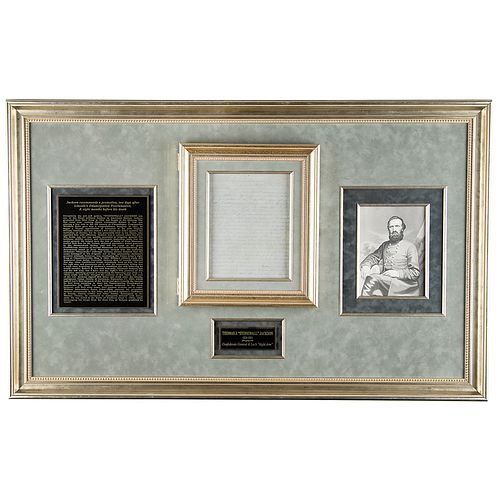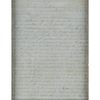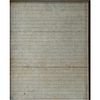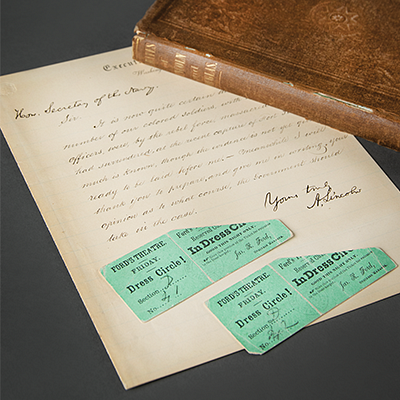Thomas J. 'Stonewall' Jackson Letter of Recommendation for Cavalry Commander William 'Grumble' Jones
Two ways to bid:
- Leave a max absentee bid and the platform will bid on your behalf up to your maximum bid during the live auction.
- Bid live during the auction and your bids will be submitted real-time to the auctioneer.
Bid Increments
| Price | Bid Increment |
|---|---|
| $0 | $5 |
| $50 | $10 |
| $200 | $25 |
| $500 | $50 |
About Auction
Sep 23, 2023
RR Auction support@rrauction.com
- Lot Description
Civil War-dated ALS in pencil, signed “T. J. Jackson Maj. Genl.,” one page both sides, 7.25 x 9.25, September 24, 1862. Addressed from “Headquarters, V. District,” a handwritten letter to General Samuel Cooper, the adjutant general and inspector general of the Confederate army, in full: “I respectfully recommend that Colonel W. E. Jones of the 7th Va. Cavly. be promoted to a brigadier general of cavalry and assigned to the brigade lately commanded by Brig. Genl. B. H. Robertson of which Col. Jones regt. formed a part. Col. J. graduated at West Point in 1848, was for several years in the mounted service of the United States; at the opening of the present war, he brought a company of cavalry into our service, and was appointed Col. of the 1st Va. Cavalry where he continued to serve until the reorganization of the regiment when he was not retained. When the Cavalry of the Valley District was organized, he was appointed colonel of the 7th Regiment, in which position he served under my command and greatly to my satisfaction. I have found him prompt and efficient in the discharge of every duty. His disposition is to be near the enemy and ever on the alert. His engagement with the enemy at Orange Court House was highly creditable to him, and should he be entrusted with the command of a brigade much valuable service may be anticipated should opportunities offer. I am not acquainted with any other field officer of Cavalry whom I regard as so well qualified for commanding a brigade as Colonel Jones.” Expertly matted and framed with glass on both sides and hinged against a display with an engraved portrait, a biographical plaque, and a transcription of the letter to an overall size of 42.5 x 26.5. In fine condition. This rare letter dates to four days after the Battle of Shepherdstown on September 19 and 20, which ended in a Confederate victory and helped prevent the Union army from pursuing General Lee's retiring army, and five days before Union troops were routed by artillery fire at the Battle of Newtonia on September 30.
Jackson proved correct in his assessment of William Edmondson Jones (1824-1864), who did receive the promotion recommended in this letter. Given the well-earned nickname ‘Grumble’ for his irritable disposition, Jones distinguished himself as a cavalry leader at Brandy Station and during the Second Bull Run Campaign. As Jackson mentions, Jones proved a formidable leader during a skirmish at Orange Court House on August 2, 1862, which marked the first of very few instances of mounted urban cavalry fighting in the Civil War. Outnumbered by Union forces by nearly five to one, Jones and his 7th Virginia Cavalry reinforced the 17th Battalion in a valiant stand of men and horses. ‘No time could be afforded for inquiries‰Û_to fight or run were the only alternatives,’ Jones declared. ‘I chose the former, and, as it turned out, against immense odds.’ In the end, Jones and the Confederate soldiers retreated to Willis Mansion south of town to regroup and await reinforcements, but the heroics of the day, in the face of such overwhelming odds, reached the desk of Jackson, who impressed upon General Cooper the necessity to promote Colonel Jones. - Shipping Info
-
Bidder is liable for shipping and handling and providing accurate information as to shipping or delivery locations and arranging for such. RR Auction is unable to combine purchases from other auctions or affiliates into one package for shipping purposes. Lots won will be shipped in a commercially reasonable time after payment in good funds for the merchandise and the shipping fees are received or credit extended, except when third-party shipment occurs. Bidder agrees that service and handling charges related to shipping items which are not pre-paid may be charged to a credit card on file with RR Auction. Successful international Bidders shall provide written shipping instructions, including specified Customs declarations, to RR Auction for any lots to be delivered outside of the United States. NOTE: Declaration value shall be the item’(s) hammer price and RR Auction shall use the correct harmonized code for the lot. Domestic Bidders on lots designated for third-party shipment must designate the common carrier, accept risk of loss, and prepay shipping costs.
-
- Buyer's Premium



 EUR
EUR CAD
CAD AUD
AUD GBP
GBP MXN
MXN HKD
HKD CNY
CNY MYR
MYR SEK
SEK SGD
SGD CHF
CHF THB
THB















